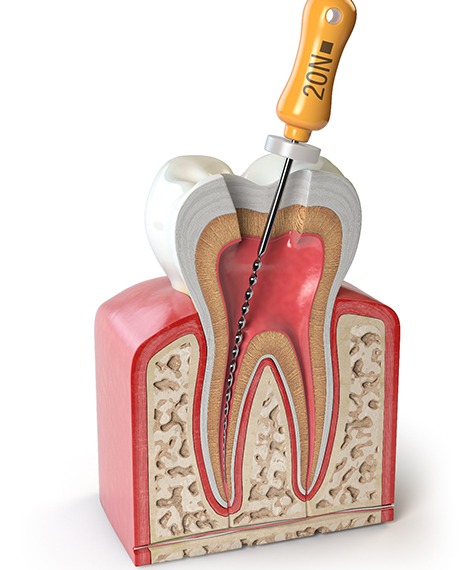Root Canal Treatment – Henderson, NV
Stopping the Pain in Your Tooth
What does it mean if your tooth is in constant pain? In many cases, it could be a warning sign of a serious infection. Fortunately, Dr. Noorda can help you find relief from your discomfort – and save your tooth in the process – with a root canal treatment. And thanks to modern dental advancements and techniques, this procedure is nowhere near as frightening as many people believe. Reach out today if you think you may be in need of a root canal.
Why Choose Dental Excellence: Dr. Brett Noorda for Root Canal Treatment?
- Relaxing Sedation Dentistry
- State-of-the-Art Technology
- Wide Range of Dental Insurance Plans Accepted
Do I Need Root Canal Treatment?

-Krystin S. recommends Dental Excellence: Dr. Brett Noorda.
Dr. Noorda is an excellent dentist. I have been avoiding the dentist for over 8 years due to a prior dental experience. Dr. Noorda and his staff make your experience calming, reassuring and has a homely atmosphere. I had 2 root canals, 1 filling and a deep cleaning all in 3 hours, but due to IV and oral sedation, it didn't phase me one bit. I highly recommend Dr. Noorda and his staff. Wonderful!! A++++
A root canal treatment is required if the pulp inside a given tooth has become infected. A severe toothache that won’t go away is often a strong indicator that you have a tooth infection. There are also a number of other warning signs you can look out for, such as:
- Feeling a sharp pain when you bite or chew.
- Experiencing severe sensitivity whenever something hot or cold touches your tooth.
- Gum tissue around the tooth in question becoming red or swollen.
- The affected tooth becoming discolored.
- A bump resembling a pimple appearing on the gums.
As soon as you notice any of the symptoms listed above, you should give our office a call. Time is of the essence; you will want to have the issue diagnosed as soon as possible so that you can get the treatment that you need.
The Root Canal Process

First of all, it’s important to note that root canal treatment is actually nowhere near as painful as its reputation suggests. Our team will always begin the procedure by administering a local anesthetic. This helps ensure that your mouth stays numb during the process; you might feel some pressure, but there will be little to no discomfort.
In order to perform a root canal, we will need to create a small opening in your tooth. This allows us to take out the damaged or infected pulp before any further harm can be done. The next step is to sanitize the inside of your tooth; we need to make sure that there are no bacteria left behind. Once the cleaning is done, a biocompatible material called gutta-percha will be used to help the treated tooth maintain its shape.
At the end of your root canal treatment, a temporary crown will be placed on the tooth. A permanent crown will be placed at a later appointment. This step is important for ensuring that you are still able to use the tooth in question normally.
The Benefits of Getting a Root Canal

When a root canal treatment is recommended, it is best to have the procedure performed as soon as possible. Doing so will allow you to enjoy the following benefits:
- You will be able to avoid more severe health issues that might have occurred if the infection was allowed to spread.
- You will be able to save the affected tooth, thus allowing you to keep your natural smile intact.
- You won’t have to live with discomfort in your tooth anymore.
Understanding the Cost of Root Canals

You may accept that root canal therapy can play a key role in your oral health and overall wellness, but it is also natural for you to pay close attention to the financial aspect of your dental care. During your consultation, our Henderson, NV, team will present transparent pricing details and explain every payment option available to you. For example, we welcome insurance and accept low-interest financing through third-party companies. We even have a convenient in-house discount plan.
Factors That Can Affect Root Canal Cost

Several elements play a role in determining the overall cost of root canal treatment:
- The tooth in need of treatment influences the price, since certain teeth are more structurally complex and may be located in less accessible areas of the mouth than other teeth. These factors often require additional expertise and time, which may result in higher fees.
- The complexity of your individual case also matters. Our experienced team can handle a wide variety of root canal procedures right here in our Henderson dental office. On occasion, though, we refer patients to an endodontic specialist. The specialist may have a financial policy that is quite different from our own.
- Additional procedures, such as a dental crown following a root canal, also contribute to the total cost of care. Sedation during your procedure is another potential expense to consider.
Is It Cheaper to Pull My Tooth?

Tooth extraction often comes at a lower initial cost than root canal treatment. However, we encourage you to consider the bigger financial picture. After an extraction, replacing the missing tooth with a dental implant or bridge becomes important to maintain proper oral function and an attractive smile. Without replacement, you may experience shifting teeth and an increased risk of future tooth loss. The cost of replacing a tooth can reach several thousand dollars.
In contrast, preserving your natural tooth with root canal therapy helps you avoid these complications and can save you money over time. In many cases, it can serve as a “one and done” treatment!
Does Dental Insurance Cover Root Canals?

Many dental insurance policies offer coverage for root canal treatment. Root canals frequently fall under the category of major procedures, which means your plan may cover approximately 50% of the cost, up to the amount of your annual maximum benefit. Our office welcomes all PPO insurance, and we are even in-network with several popular plans. We take pride in helping you maximize your insurance benefits, so do not hesitate to ask us for assistance in this area.
Other Options for Making Root Canal Therapy Affordable

Beyond insurance, other provisions that could ease the financial strain of this treatment include:
- We work with CareCredit and Sunbit to provide low-interest payment plans. The application process is fast, and most patients qualify for a monthly installment amount that works with their budget.
- In-house savings plan. With our Smile Protection Savings Program, you can enjoy a 15% discount on many of the services available in our office, including root canal therapy. Signing up is easy, and you can start to use your benefits immediately. Plus, your annual fee covers all routine preventive care.
If you would like more information about root canal therapy and its associated costs, our team stands ready to answer your questions! Contact us today to arrange your consultation and take the next step toward a healthier smile.
Root Canal FAQs
How Much Pain is Normal After a Root Canal?
Thanks to the numbing agent we use, you won’t feel any pain or discomfort during the root canal procedure. Once that wears off, however, you may begin to experience some soreness. Usually, this subsides around the three-day mark, and there are several things you can do to stay comfortable. That includes sticking to soft foods, rinsing with warm saltwater periodically, and taking OTC pain medication as directed.
Note: If your symptoms seem to be getting worse instead of better, don’t hesitate to give us a call, especially if you think an infection has developed.
Can I Eat Before a Root Canal?
That depends largely on whether sedation dentistry is a part of your treatment plan or not. If it is, then we may ask that you stick to water the morning of your procedure. If it isn’t, then you should be okay to eat a meal or snack prior to your arrival at our office (ideally something that’s well-balanced and low in added sugar).
Can Root Canals Be Prevented?
Yes, root canals can typically be prevented! That’s one of the many reasons we encourage our patients to commit to a solid at-home oral hygiene regimen, including flossing and rinsing with mouthwash consistently. It’s also important to adopt other healthy habits, including wearing a mouthguard when playing sports, coming in for a checkup and cleaning twice a year, and keeping your consumption of added sugar to a minimum.
Tip: If you seem to be prone to oral health problems like tooth decay, don’t hesitate to ask our team for tips on how to improve your at-home oral hygiene regimen!
What Happens if You Wait Too Long for a Root Canal?
If you decide to take the “wait and see” approach, you’ll be disappointed. That’s because dental damage of this caliber cannot heal on its own. In fact, it will worsen over time, and may even progress to the point where saving your tooth is no longer an option. That’s why we strongly recommend getting the restorative care you need when we first recommend it!
Note: If your once painful toothache goes radio silent, it’s likely because the infection has “killed” the nerve of your tooth. So, coming in for root canal treatment is still a priority!
Can I Take Antibiotics Instead of Getting a Root Canal?
No, antibiotics are not an adequate alternative to root canal treatment. That’s because this infection-fighting medication travels through your bloodstream, which cannot reach the pulp of your tooth. As a result, the only way to restore the look, health, and function of your smile is to come in for the necessary care.
